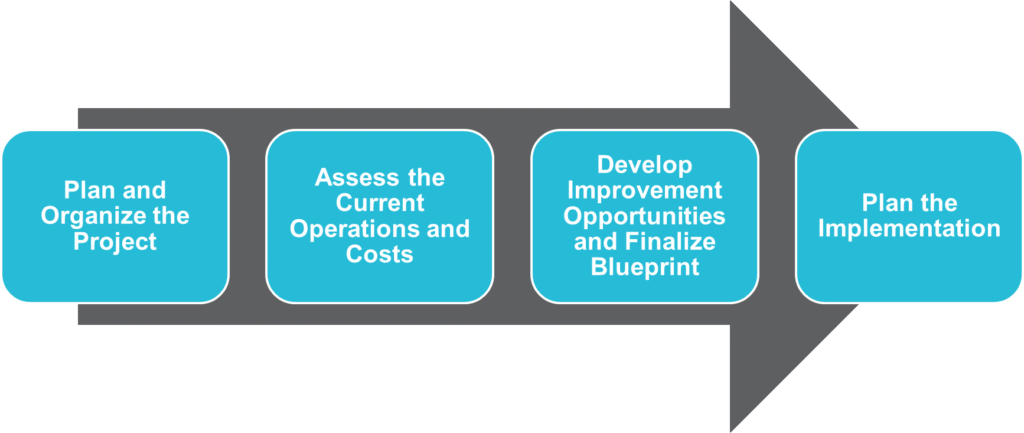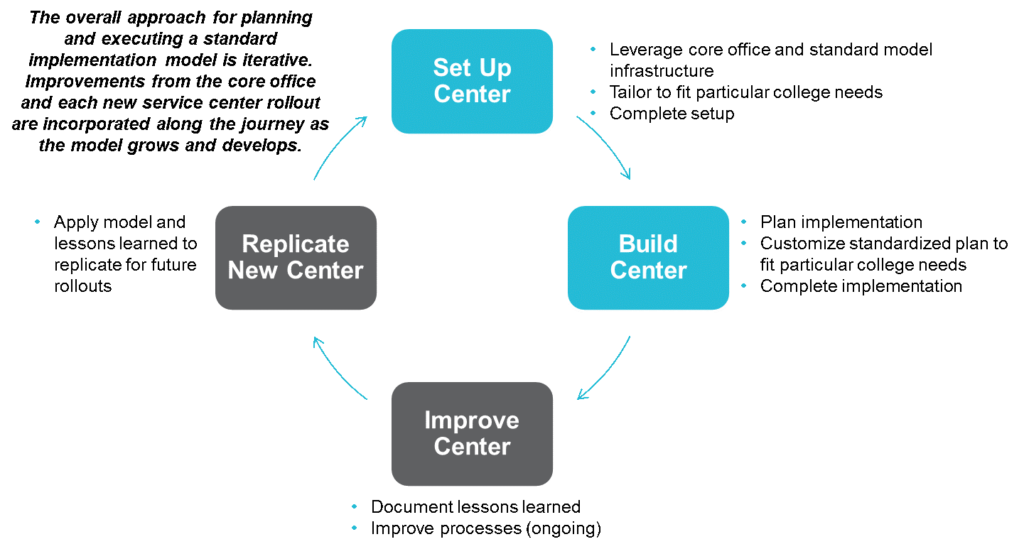
As a major public research university and one of the five largest universities in the country with nearly 50,000 students enrolled, the University of Florida has a long history of established programs in global education, research, and service. The university is similar to other higher education institutions because it has undergone recurring budget constraints while administrative requirements have continued to grow. As a result, the university has been exploring a centralized shared services solution. The university’s CFO chartered a team to stand up a small service center to provide transaction processing for HR and financial processes for the CFO’s office, including finance and accounting, purchasing, contracts and grants, and budget, which reside under the CFO’s umbrella, as well as the privacy office, and university relations administrative units.
In a parallel effort, several colleges within the university have responded to the budgetary pressures by scaling back administrative staff, thereby sacrificing the level of services to their departments and faculty. Following the university’s lead, two of the largest colleges—the College of Liberal Arts and Sciences (CLAS) and the Institute of Food and Agriculture Sciences (IFAS), which includes the College of Agriculture and Life Sciences, have sought out shared services as a solution to manage their administrative costs and improve their customer service levels.
IFAS decided to leverage its previous administrative staff cuts and set forth a plan to evaluate and implement two centralized service centers to provide HR, fiscal, and contracts and grants administrative services to some of its departments. The primary goal of these service centers was to improve effectiveness and strengthen the college’s culture of service by ensuring that academic support activities and business practices were efficient, responsive, and cost effective. Initially, one center provided service to three large departments and the other center to seven additional departments located across campus. Select on-campus departments and remotely located research centers and extension offices throughout the state were excluded from the initial scope. A memorandum of understanding was developed to document services for centralization and those that would remain in the departments.
ScottMadden was engaged to evaluate the initial plan and design, develop improvement recommendations, create a future state blueprint, and plan for the phased rollout. The ScottMadden project team conducted a series of workshops and interviews to understand and document the current state and provide recommendations for improvement.
The primary objective for IFAS was to reduce work and reallocate resources by standardizing policies and processes across the units and to consolidate transactional and administrative activities into its service centers. As a result, the college sought to better align the work with the available resource skillsets as well as cross-train employees on specific responsibilities. This would allow services to be provided across multiple units and to move away from an “everyone-does-everything-for-one-customer” model to one where providers handle multiple customers and are more narrowly focused on duties within a particular function (e.g., finance, HR, etc.). Additionally, IFAS sought to improve compliance by offering cradle-to-grave contracts and grants departmental services from proposal writing through submission, project setup, administration, and project closeout.
During the initial design and implementation efforts, IFAS faced a major challenge with its primary customers—its faculty (which is very typical in the higher education environment). The memorandum of understanding had been collaboratively developed with faculty prior to opening the IFAS service center for business, but faculty did not clearly understand the scope of services or shift in delivery model. There was confusion around the detailed processes, such as who to contact when, how requests should be made, and which activities would be centralized versus remaining in the department. Additionally, there was no structure in place to determine if service improved and how service levels would be measured in the future. Staffing challenges were also steep. Given the long, tight-knit relationship and close proximity between faculty and their staff, the concept of centralization was not widely embraced by either, increasing the overall level of implementation difficulty. Additionally, the college had transitioned existing personnel from the departments into the central service center model without standardizing the processes, reducing the workload, planning for space needs, or evaluating the required skillsets to perform work in the new model. Thereby, the center maintained the same staff and skill makeup, which suboptimized the potential benefits of the transformation. Finally, the service center lacked credibility with its customers, which contradicted the primary objective of improving customer service.
ScottMadden leveraged its deep experience in shared services and higher education to work with the college leadership to assess the current environment through a structured method, including: 1) conducting focus groups with the faculty, 2) interviewing department chairs, college management, service center management, and various administrative processors, 3) conducting process-based workshops and shadow sessions, and 4) evaluating organizational transactions, labor, and cost data.

Based on the information ScottMadden obtained on the current operations and costs, we provided detailed improvement recommendations for the college related to governance, service delivery, change management, performance management, and technology enhancements.
In addition to our work at the college level, ScottMadden assisted the university in developing the broader strategy to optimize near- and long-term service delivery. As such, we helped develop a long-term shared services vision and strategic road map, consisting of an evolutionary shared services approach. Near-term initiatives included promoting a standard, local college service center implementation strategy, as well as the transformation of core office services to a shared services model. To support these initiatives, we created a shared services rollout toolkit, consisting of a standard implementation plan, tools, and templates for executing the road map. Additionally, by leveraging our proprietary FTE work activity survey, we calculated the estimated current administrative costs for HR, finance and accounting, and contracts and grants campus-wide. Based on that analysis, we developed a university opportunity assessment, estimating the potential future state cost savings assuming the university transitioned to a more cost-efficient shared services model.
Our work resulted in a positive impact for both IFAS and the university as a whole. Our analysis within IFAS led college leadership to modify its service center management structure, stand up a governance board, refine and clarify the scope of services and delivery model, create a detailed communications and change management plan, develop service levels for managing performance, and enhance training. Currently, transactional volumes and some metrics are captured in order to effectively measure and report out on service improvements to key stakeholders. The request intake process has been streamlined within the existing infrastructure to reduce backlog and ensure process efficiencies, although there is still room for improving automation.

The university committed to an integrated core office and service center delivery model, which began with sharpening its focus on its own core office services. An in-depth analysis of high-impact processes, including personnel transactions, department reconciliations, research processes, and effort reporting, resulted in:
ScottMadden led the implementation of a case management system and knowledgebase for the CLAS service center, which may be expanded to other service centers and core offices on campus. The university continues to evaluate and execute improvement opportunities to capitalize on the momentum and drive positive results.
“The ScottMadden team, from the partners to the folks ‘on the ground’ day-to-day, were great to work with. They were very professional, knowledgeable, articulate, and worked very hard,” said Assistant Vice President and University Controller at the University of Florida. “They brought to the table an expertise that blended well with the University of Florida’s subject matter experts that enabled them to provide credible guidance and judgment in the review of our business processes.”
View MoreSussex Economic Advisors is now part of ScottMadden. We invite you to learn more about our expanded firm. Please use the Contact Us form to request additional information.